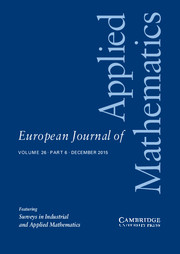Crossref Citations
This article has been cited by the following publications. This list is generated based on data provided by
Crossref.
Belishev, M I
2007.
Recent progress in the boundary control method.
Inverse Problems,
Vol. 23,
Issue. 5,
p.
R1.
Morassi, Antonino
Nakamura, Gen
Shirota, Kenji
and
Sini, Mourad
2007.
Numerical method for an inverse dynamical problem for composite beams.
Journal of Physics: Conference Series,
Vol. 73,
Issue. ,
p.
012015.
MORASSI, ANTONIO
NAKAMURA, GEN
SHIROTA, KENJI
and
SINI, MOURAD
2007.
A variational approach for an inverse dynamical problem for composite beams.
European Journal of Applied Mathematics,
Vol. 18,
Issue. 1,
p.
21.
Dilena, Michele
and
Morassi, Antonino
2009.
Vibrations of steel–concrete composite beams with partially degraded connection and applications to damage detection.
Journal of Sound and Vibration,
Vol. 320,
Issue. 1-2,
p.
101.
Belishev, M. I.
and
Pestov, A. L.
2010.
Forward dynamical problem for the Timoshenko beam.
Journal of Mathematical Sciences,
Vol. 167,
Issue. 5,
p.
603.
Rakesh
and
Sacks, Paul
2010.
Stability for an inverse problem for a two-speed hyperbolic PDE in one space dimension.
Inverse Problems,
Vol. 26,
Issue. 2,
p.
025005.
Lin, Ching-Lung
and
Nakamura, Gen
2010.
Unique Continuation Property for a Coupled Second-Fourth Order Dynamical System and Its Application.
SIAM Journal on Mathematical Analysis,
Vol. 42,
Issue. 5,
p.
2318.
Belishev, Mikhail I.
2011.
Dynamical Inverse Problems: Theory and Application.
Vol. 529,
Issue. ,
p.
85.
Jimbo, Shuichi
Morassi, Antonino
Nakamura, Gen
and
Shirota, Kenji
2012.
A non-destructive method for damage detection in steel-concrete structures based on finite eigendata.
Inverse Problems in Science and Engineering,
Vol. 20,
Issue. 2,
p.
233.
Yaman, Fatih
Yakhno, Valery G.
and
Potthast, Roland
2013.
A Survey on Inverse Problems for Applied Sciences.
Mathematical Problems in Engineering,
Vol. 2013,
Issue. ,
p.
1.
Al-Musallam, Fadhel
Boumenir, Amin
and
Sini, Mourad
2014.
Detection of multilayered media in the acoustic waveguide.
Journal of Mathematical Analysis and Applications,
Vol. 415,
Issue. 2,
p.
846.
Tang, Jiahua
and
Lacey, Andrew A
2016.
Determining the twist in an optical fiber.
Inverse Problems,
Vol. 32,
Issue. 3,
p.
035008.
Kurashiki, Daisuke
and
Shirota, Kenji
2018.
$H^2$ gradient method for the coefficient identification problem in a partial differential equation.
JSIAM Letters,
Vol. 10,
Issue. 0,
p.
37.
Pandolfi, L.
2018.
Dynamical identification of a space varying coefficient in a system with persistent memory.
Journal of Mathematical Analysis and Applications,
Vol. 465,
Issue. 1,
p.
140.
Ivanov, Sergei A.
and
Wang, Jun Min
2018.
Controllability of a multichannel system.
Journal of Differential Equations,
Vol. 264,
Issue. 4,
p.
2538.
Sklyar, G.M.
Woźniak, J.
and
Firkowski, M.
2020.
Exact observability conditions for Hilbert space dynamical systems connected with Riesz basis of divided differences.
Systems & Control Letters,
Vol. 145,
Issue. ,
p.
104782.
Guo, Bao-Zhu
and
Ivanov, Sergei A.
2021.
Finite dimensional control of multichannel systems.
Journal of Differential Equations,
Vol. 296,
Issue. ,
p.
213.
Ismailov, Mansur I.
2023.
Inverse Scattering Problem for Linear System of Four-Wave Interaction Problem on the Half-Line with a General Boundary Condition.
Zurnal matematiceskoj fiziki, analiza, geometrii,
Vol. 19,
Issue. 2,
p.
443.
Bilotta, Antonio
Morassi, Antonino
and
Turco, Emilio
2023.
Experimental Vibration Analysis for Civil Engineering Structures.
Vol. 433,
Issue. ,
p.
422.
Kawano, Alexandre
and
Morassi, Antonino
2023.
On Isospectral Composite Beams.
Applied Sciences,
Vol. 13,
Issue. 13,
p.
7606.

